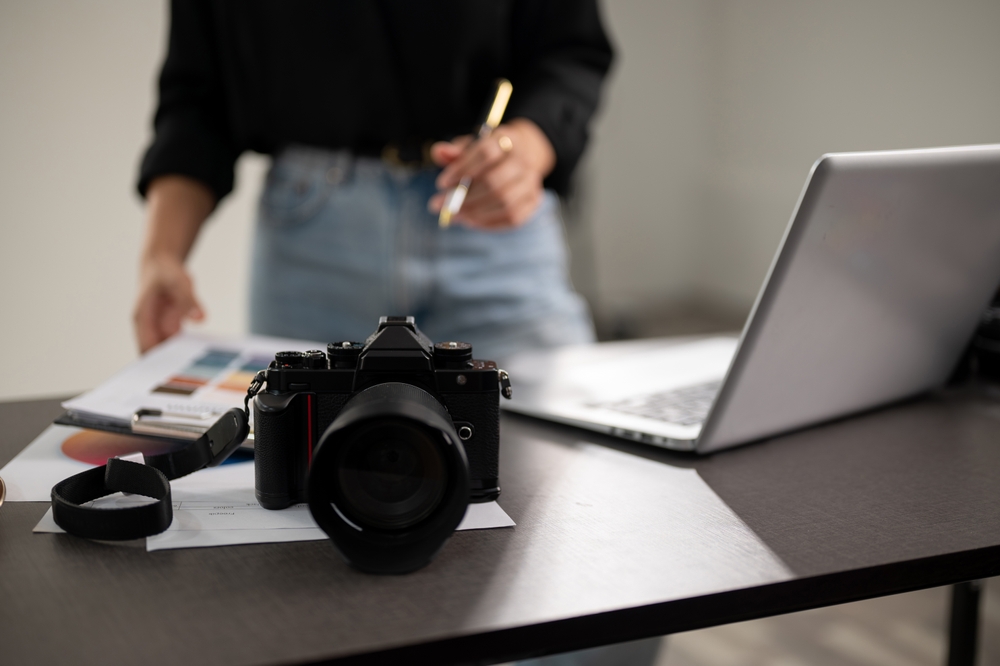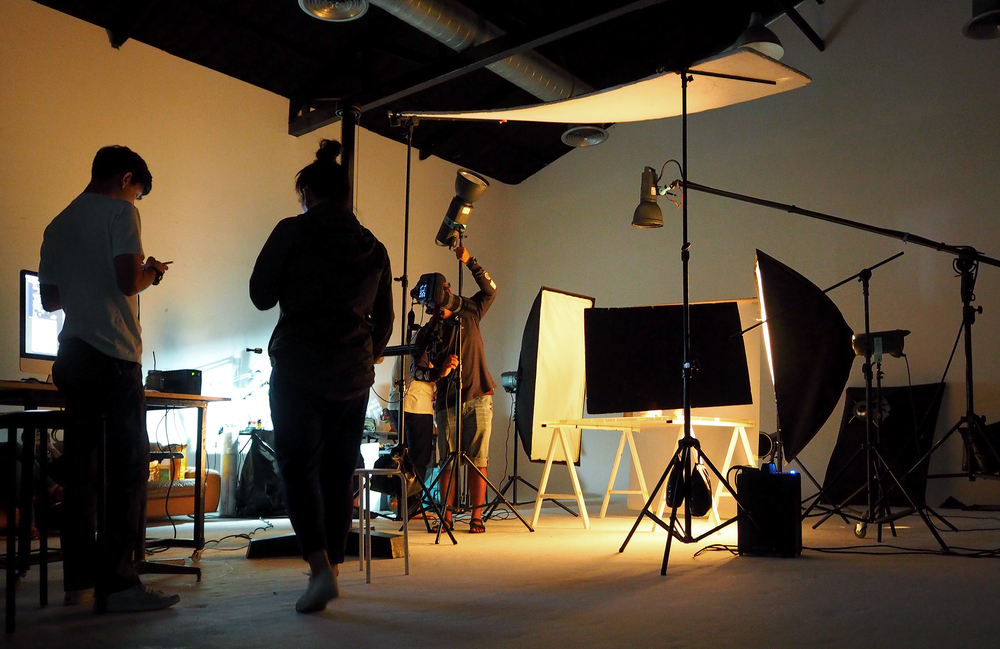Running a photography business isn’t just about creating beautiful images; it’s about building a system that works. Moreover, it’s about building a system that lets you spend more time behind the camera and less time buried in administrative tasks.
If you’re feeling overwhelmed, you’re not alone! Many photographers struggle to stay organized as their client load and creative projects increase.
Efficiency isn’t about rushing through your work, though. It’s about making informed decisions, building repeatable systems, and leveraging tools and partners that support your goals. When your business runs smoothly, your creativity has room to breathe, and your profits tend to follow.
Table of Contents
- Create and Stick to a Weekly Workflow Schedule
- Automate Repetitive Tasks
- Use a Trusted Drop Ship Printing Partner
- Build Repeatable Client Onboarding and Offboarding Systems
- Outsource When It Makes Sense
- FAQ<
Create and Stick to a Weekly Workflow Schedule

Photo by BongkarnGraphic via Shutterstock
One of the biggest shifts I made in my photography business was creating a weekly schedule and sticking to it. In the beginning, I was reacting to everything—emails, edits, client calls—all scattered across my week. It felt like I was busy 24/7, but nothing ever felt finished.
Now, I plan my week in advance. I batch similar tasks together: editing on Mondays, client calls on Tuesdays, marketing on Wednesdays. I block off time for creative work and time for business admin. It’s a total game-changer. When you give tasks a home on your calendar, you stop wasting energy deciding what to do next.
Use tools like Google Calendar, Notion, or even a paper planner to map out your week. It doesn’t have to be rigid—just structured enough to keep you focused. The more predictable your week, the easier it becomes to build momentum and avoid burnout.
Your photography business thrives when you treat your time like it matters—because it does. Every hour you save by working smarter can be reinvested into your clients, your art, or your own well-being.
Automate Repetitive Tasks

Photo by Southworks via Shutterstock
As your photography business grows, so do the little tasks. Sending booking confirmations, following up with clients, posting to social media—it all adds up. Automating those repetitive processes can save you hours every week.
Start with your client communication. Tools like HoneyBook, Dubsado, or Studio Ninja let you set up automated email workflows. You can send booking reminders, session prep guides, and thank-you emails without lifting a finger. It feels personal to your clients, but it runs on autopilot for you.
Need help keeping your calendar organized? Use a tool like Calendly so clients can book directly into your schedule. Want to get paid faster? Set up automatic invoicing and payment reminders.
Automation doesn’t mean becoming a robot. It means freeing yourself from the mental load of repeating the same steps over and over. It gives you more energy for the creative parts of your work—the part that made you start a photography business in the first place.
Use a Trusted Drop Ship Printing Partner

One of the most time-consuming parts of my photography business used to be print fulfillment. I loved offering clients beautiful products, but managing orders, packaging prints, and making trips to the post office became overwhelming fast.
That’s when I discovered Lumaprints and their print-on-demand drop ship service. They’ve completely transformed how I handle print sales. Now, when a client places an order, Lumaprints handles everything—from production to shipping—quickly and professionally.

Their process is simple: I upload my print designs, connect my store, and promote my products. When a sale comes in, Lumaprints prints the item, adds custom branding like my logo or thank-you notes, and ships it directly to the customer. No inventory, no shipping hassles, and no extra stress.
It’s fast, affordable, and lets me scale without worrying about logistics. And because they offer museum-grade quality prints with coast-to-coast U.S. shipping, I know my clients are getting the best. If you’re looking to boost efficiency in your photography business, Lumaprints is a no-brainer!
Build Repeatable Client Onboarding and Offboarding Systems

Photo by New Africa via Shutterstock
Consistency builds trust. When clients know what to expect at every step, they feel confident in your process. That’s why having a repeatable system for onboarding and offboarding is so important in your photography business.
For onboarding, create a welcome email that outlines what’s next. Include what to wear, how to prep for the shoot, and what turnaround times look like. You can also build an online guide or PDF packet with session tips and FAQs. Deliver it automatically using your CRM or email marketing platform.
After the shoot, use a checklist to make sure nothing slips through the cracks. Send a thank-you note, deliver the gallery, offer print options (maybe using your Lumaprints store), and follow up for feedback or testimonials. When every client has the same high-level experience, your reviews and referrals will reflect that.
Systems don’t have to be complex—they just have to be consistent. Once you build your client journey, you’ll stop reinventing the wheel with every new project.
Outsource When It Makes Sense

Photo by gnepphoto via Shutterstock
Here’s a truth that took me a while to accept: you don’t have to do everything yourself. In fact, trying to handle every task can hold your photography business back. Strategic outsourcing is a smart way to grow and protect your time.
Start by identifying tasks that drain your energy or fall outside your zone of genius. That might be editing, bookkeeping, blogging, or managing social media. You can find freelancers or agencies who specialize in those areas, freeing you up to do what you love most—shoot and serve your clients.
Think of outsourcing as an investment. When you delegate effectively, you create space to take on more clients, focus on long-term strategy, or even just rest. And with partners like Lumaprints handling your print fulfillment, you don’t just save time; you elevate your client experience, too.
You don’t have to grow your business alone. Building a support network of tools and people can make all the difference!
Efficiency Takes Time

Photo by Olena Yakobchuk via Shutterstock
Remember, efficiency doesn’t happen by accident—it’s built one smart decision at a time. By organizing your week, automating where you can, and partnering with trusted services like Lumaprints, you can free up time, reduce stress, and focus on the part of your photography business that lights you up.
Don’t try to do it all. Work smarter. Streamline your workflow, deliver a better client experience, and give yourself the space to grow. Your photography business—and your peace of mind—will thank you for it.
FAQ

Photo by Gorodenkoff via Shutterstock
How can I make my photography business more efficient?
Start by creating a structured weekly schedule, automating repetitive tasks, and building systems for client management. Use tools and partners like Lumaprints to handle tasks like print fulfillment so you can focus on shooting and growing your brand.
What is print-on-demand, and how does it work for photographers?
Print-on-demand allows you to sell prints without holding inventory. When a client places an order, a service like Lumaprints prints and ships the product directly to them. It’s fast, professional, and removes the stress of handling fulfillment yourself.
Is it worth outsourcing parts of my photography business?
Yes. Outsourcing tasks like editing, bookkeeping, or fulfillment can free up time, reduce stress, and let you focus on your core strengths. It’s one of the smartest ways to scale your business without burning out.
Why should I use Lumaprints for print fulfillment?
Lumaprints offers museum-grade quality prints, custom branding, coast-to-coast U.S. shipping, and a fast, automated drop shipping service. Their print-on-demand model helps you scale with less effort and keeps your brand looking professional.
Just so you know, some of the cool stuff we mention comes with affiliate links, meaning we earn a commission if you buy (no extra charge to you!). Plus, we occasionally feature sponsored content, but rest assured, we only shout out products we genuinely stand behind.
Learn More:
- 5 Reasons Why Print-on-Demand Services Should Be Part of Your Photography Business Plan
- What I Wish I Knew Before Going Full-Time in Photography
Hero photo by Jacob Lund via Shutterstock


I developed my passion in photography, which marked the beginning of my adventure. I learned film photography back then, and then in the early 2015, I accepted my first digital camera as the techniques evolved to digital. Since then, I’ve developed into a skilled photographer who appreciates many kinds of photography endeavors, including landscapes, portraits, and cityscapes.